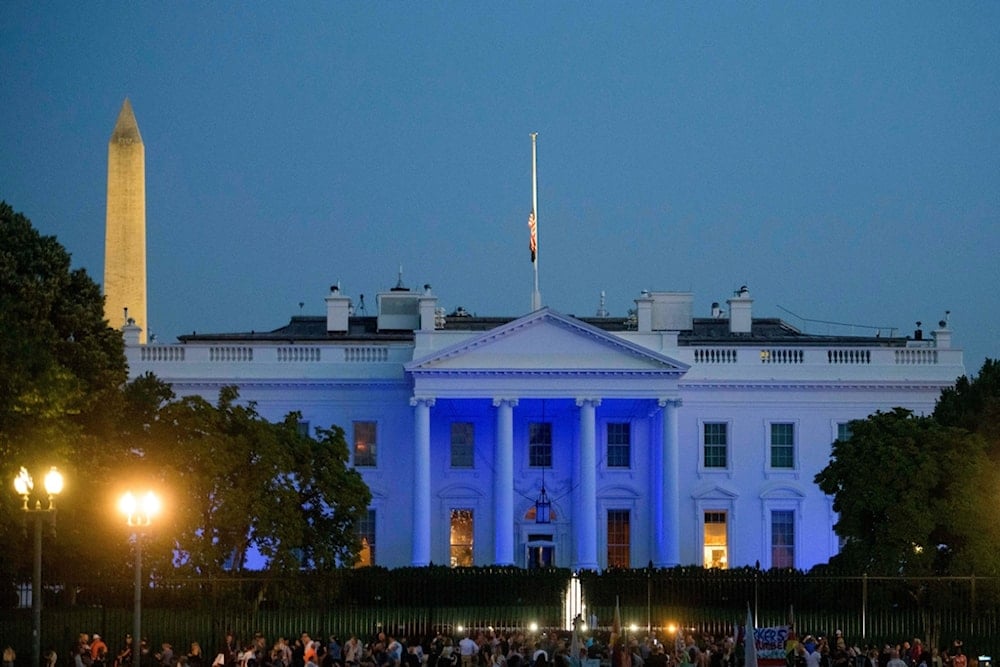Trump vetoed Israeli plot to assassinate Sayyed Khamenei: Reuters
US President Trump reportedly blocked an Israeli plan to assassinate Ayatollah Khamenei as evidence mounts of US complicity in Israeli attacks despite Washington's public denials.
-

The White House is seen illuminated in blue lights, in observation of National Police Week in Washington, Thursday, May 15, 2025. (AP Photo/Rod Lamkey, Jr.)
Reuters reported on Sunday, citing two US officials, that President Donald Trump recently blocked an Israeli plan to assassinate Iran's Leader, Ayatollah Ali Khamenei, amid the escalating confrontation between Tehran and Tel Aviv.
"Have the Iranians killed an American yet? No. Until they do we're not even talking about going after the political leadership," a senior US administration official told Reuters, exposing the conditional logic behind the White House's military posture, one that still regards Iranian restraint as a threshold for escalation.
When pressed on the Reuters report, Israeli Prime Minister Benjamin Netanyahu refused to confirm or deny the assassination plot. "There's so many false reports of conversations that never happened, and I'm not going to get into that," he told Fox News. Instead, he vaguely reaffirmed, "We do what we need to do."
The revelation comes as "Israel" faces a powerful and coordinated Iranian retaliation under Operation True Promise 3, following Tel Aviv's unprovoked airstrikes on Iranian territory. The Iranian response, involving hundreds of drones and precision-guided missiles, has struck deep into occupied territories, including central Tel Aviv and Haifa, causing extensive damage and demonstrating Tehran's growing deterrent capability.
Calculated complicity
Despite Trump's public claims that "the US had nothing to do with the attack on Iran," mounting evidence, including an Axios report and statements by Iranian officials, points to deep American involvement. "We had a clear US green light," one Israeli official reportedly said.
Iranian President Masoud Pezeshkian confirmed Sunday that "Israel's actions are being carried out with the direct approval of the United States," citing US envoy Steve Witkoff's admission to Iranian diplomats that Tel Aviv "cannot do anything without Washington's permission."
Trump himself, in a separate interview, acknowledged that "Israel used great American equipment" during the assault, an inadvertent confirmation of US complicity in what Tehran has described as an act of state terrorism.
Yet in a contradictory public posture, Trump told reporters Sunday that the conflict "could be ended easily," provided Iran refrains from striking American targets. The comments came shortly after a previously undisclosed interview with ABC News correspondent Rachel Scott, in which Trump admitted, "It's possible we could get involved," while simultaneously claiming that the US is "not at this moment" engaged.
Meanwhile, Netanyahu openly suggested that destabilizing Iran's political system could be an outcome of continued Israeli aggression. Although "Israel's" military spokesperson claimed the current campaign is aimed at dismantling Iran's nuclear and missile programs, Netanyahu's remarks suggest broader ambitions.
"We'll do whatever is necessary to remove the existential threat," he said.
Read more: US backing Israeli attacks, Iran to respond decisively: Pezeshkian
Iran, for its part, maintains that it has never sought war. President Pezeshkian reiterated that the Islamic Republic's response is a legitimate act of defense against coordinated foreign aggression, adding that Iran will not tolerate continued violations of its sovereignty.

 3 Min Read
3 Min Read










